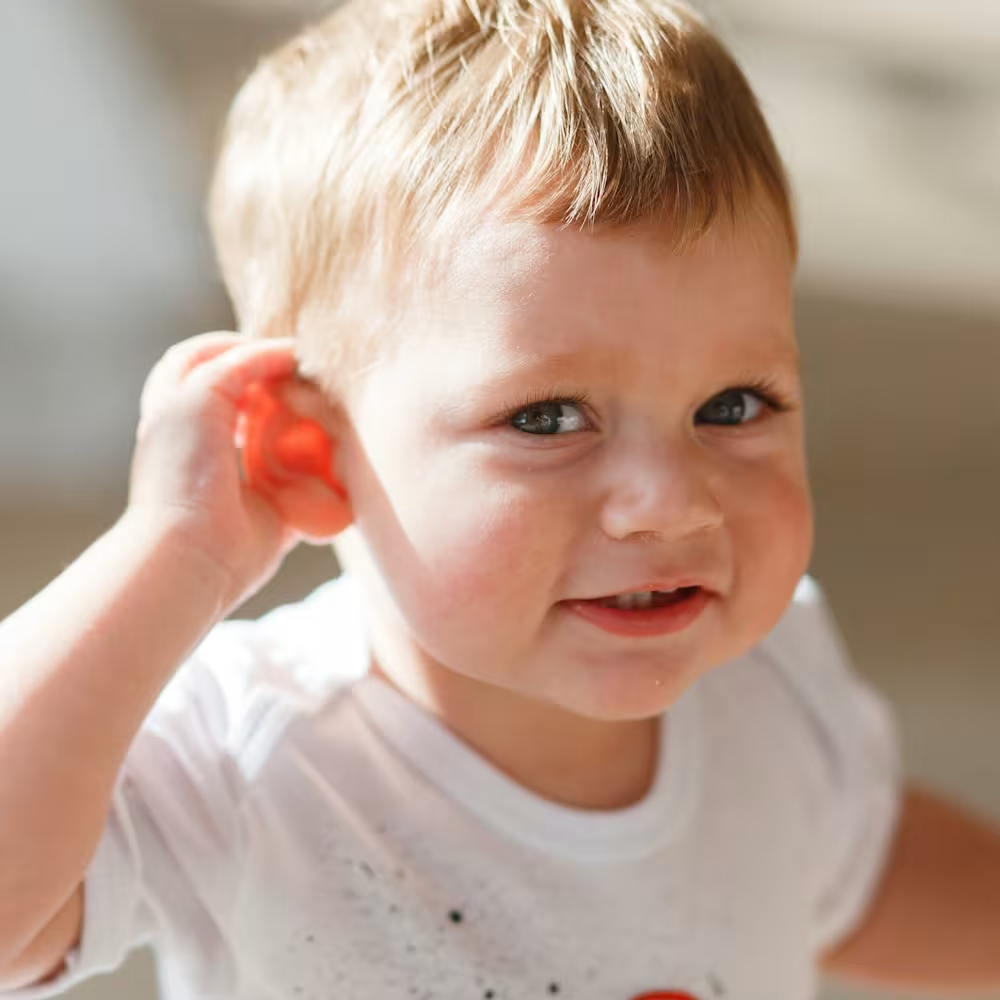Baby sleeping with mouth open, is it normal? When to worry
Updated Dec 29, 2025

Little ones like to keep parents on their toes! Doesn’t it seem like there’s always something new to worry about? Issues that impact breathing and sleep — like when your child is congested and starts sleeping with their mouth open — can be especially stressful. Luckily, occasional mouth breathing is pretty normal.
In this article, we’ll walk you through why babies may temporarily breathe orally instead of nasally, guide you to resolve congestion, and let you know when persistent mouth breathing may indicate a more complex issue.
Is it common for a baby to sleep with mouth open?
It’s rare for babies and adults to breathe exclusively through their mouths [] long-term while awake and keep their mouths open while asleep. Nasal breathing is generally the norm for all ages.
This is especially the case in the first months of life when young babies are “obligate” or “preferred” nose breathers. Newborns rely on breathing through their noses to find their food (breast or bottle) and feed []. They need to breathe through their nose to eat properly with their mouth! However, it’s common for babies (and everyone else) to occasionally breathe through their mouths and sleep with their mouths open if there’s some sort of nasal obstruction, whether it’s a stuffy nose due to a cold or a more complex issue.
Causes of baby sleeping with mouth open
There are a few reasons why babies sleep with their mouths open. They include:
Nasal congestion: make it hard for little ones to breathe normally with all that icky mucus, so they’ll often switch to oral breathing [] out of necessity. This may lead to sleeping with an open mouth too.
Enlarged adenoids: Enlarged adenoids are more common in children 2 - 4 years old. However, they may be present in children under 12 months []. Enlarged adenoids may cause mouth breathing, congestion, snoring, ear problems, sleep apnea, and more.
Other health reasons: Oral breathing and sleeping with an open mouth can also be caused by issues like a deviated septum [] or choanal atresia [], when the nasal airway is blocked or constricted by tissue. If you suspect your child’s mouth breathing is due to a medical condition, reach out to their healthcare provider for support.
Habit: If your little one often sleeps with their mouth open (due to illness, snoring, etc.), mouth breathing may become their norm.
Potential consequences of baby sleeping mouth open long-term
If your baby is breathing and sleeping with an open mouth, chances are this is temporary. Breathing normally happens through the nose — for children and adults. It’s rare [] for people to only breathe through their mouths. On the other hand, long-term mouth breathing (generally regarded as doing so for more than 6 months []) can lead to more complex health issues.
If your baby persistently sleeps with an open mouth, this may lead to long-term issues as they get older, such as:
Sleep disorders: Sleeping with an open mouth can lead to restless sleep, poor sleep quality, snoring, daytime sleepiness, drooling during sleep, obstructive sleep apnea [], etc.
Respiratory issues: Mouth breathing is linked to issues like breathlessness [], getting tired easily during physical activities, and dry mouth.
Dental issues: Mouth breathing (during awake and sleep times) may lead to dental problems like malocclusion [] (when upper and lower teeth aren’t aligned). It can also impact facial development and cause narrow faces and receding chin or jaws, referred to as “mouth breathing face. []”
Speech impairments: Persistent mouth breathing, which typically coincides with sleeping with an open mouth, may lead to future speech sound disorders [], like frontal lisps.
Developmental issues: If mouth breathing continues in older children [], they may experience irritability, difficulty concentrating in school, reading comprehension disorders, and working memory deficits.
You know your baby best! If you notice any red flags regarding your child’s breathing, sleeping, or overall health, consult their healthcare provider.
Remedies for short-term baby mouth breathing
If your little one is congested and breathing through their mouth, some home remedies may help alleviate their symptoms so they can go back to nasal breathing. If your child’s mouth breathing is due to another issue (like a deviated septum or a condition blocking their airway) and requires medical treatment, seek guidance from their pediatrician. Here are some tips for short-term mouth breathing:
Tip | Why it helps | How to try it |
|---|---|---|
Clear the nose before sleep and feeds | Less mucus means easier breathing, eating, and settling. | Use saline drops to loosen congestion, then gently suction right before naps, bedtime, or meals. |
Add moisture to the air | Humid air can soothe irritated nasal passages and reduce stuffiness. | Run a cool-mist humidifier in the room or try a brief steam session in the bathroom before sleep. |
Keep fluids coming | Hydration helps thin mucus and supports comfort and recovery. | Offer regular breast milk or formula feeds (and water if age-appropriate) throughout the day. |
Watch comfort cues | Overdoing interventions can make congestion worse or stress your baby out. | If your baby seems content and breathing well, you may not need to intervene every time. |
Find more info below:
Tip #1: Remove mucus before sleeping and eating
Getting rid of as much snot as possible before your child eats and sleeps can help them breathe easier. Consider using a few drops of saline [] to loosen any stubborn mucus and a bulb syringe (or other similar device) to gently relieve congestion.
Tip #2: Try a humidifier or steam treatment
Using a vaporizer or cool-mist humidifier in your baby’s room can also help clear out stuffiness, allowing them to breathe more easily through their nose while sleeping. Aim to place the machine away from their sleep space for safety reasons, but keep it close enough that the mist reaches them. Note that most models require new water every day. Always follow the manufacturer’s directions for cleaning and use to prevent bacteria and mold.
Steam is another way to alleviate congestion for your little one. Before sleep times (or whenever they’re extra stuffy), run hot water in the bathroom for a few minutes while keeping the door closed. Then take your baby in the room and sit with them while they breathe in the steamy air as long as they tolerate it. If your child becomes overheated or fussy, we recommend leaving the room and trying again another time.
Tip #3: Ensure your little one is hydrated
Proper hydration (breast milk and/or formula for babies under 12 months) can be helpful for babies who are breathing through their mouths due to congestion. Benefits include:
Preventing dehydration
Loosening and thinning mucus, which can make breathing easier while eating and sleeping
Supports a healthy immune system
Helps regulate body temperature
Leads to improved sleep — babies typically have trouble falling asleep and staying asleep when they’re hungry
When to call a doctor
You’re an expert on your baby! Typically, sporadic oral breathing is due to factors like colds and is not cause for alarm. If they’ve started breathing through their mouth during the day and when sleeping, keeping tabs on their overall mood and energy levels, eating, and/or wet diapers can be helpful when gauging whether a doctor should see them.
If your child persistently breathes through their mouth, even after congestion clears, consider seeking support from their pediatrician to rule out any other factors. It’s typically best to err on the side of caution!
Takeaway
It’s uncommon for children and adults to breathe exclusively through their mouths [] long-term during awake and sleep times. However, oral breathing is often due to some sort of blockage of the nasal passage, typically due to colds or allergies, and will resolve once the congestion clears.
If oral breathing is due to congestion, try home remedies like saline drops, gentle suction, steam treatments, and/or using a vaporizer for sleep.
Persistent mouth breathing (generally for longer than 6 months) may indicate a more complex issue is present. Prolonged oral breathing may be due to health factors like enlarged adenoids, a deviated septum [], choanal atresia [] (when the nasal airway is blocked or constricted by tissue), etc.
Mouth breathing may have short and long-term impacts on sleep, speech, facial structures, and other facets of development. Contact your child’s healthcare provider if you notice any red flags around their breathing habits.
Share article:
Note: The content on this site is for informational purposes only and should not replace medical advice from your doctor, pediatrician, or medical professional. If you have questions or concerns, you should contact a medical professional.
10 Sources
Share article:





